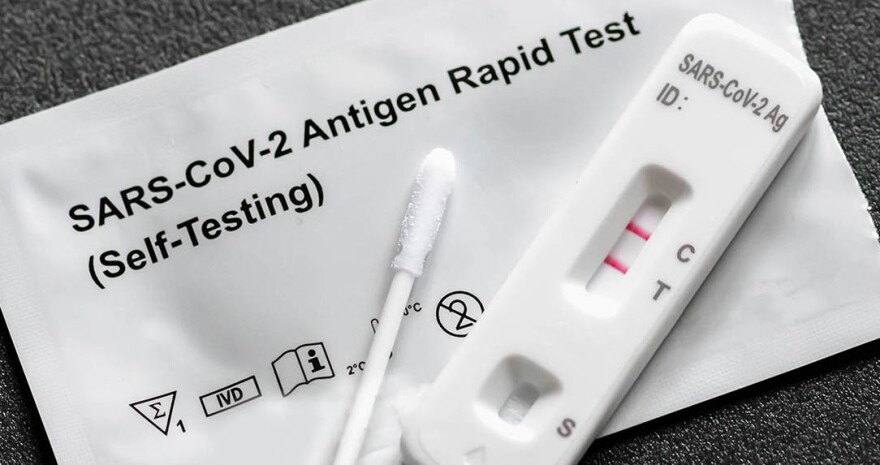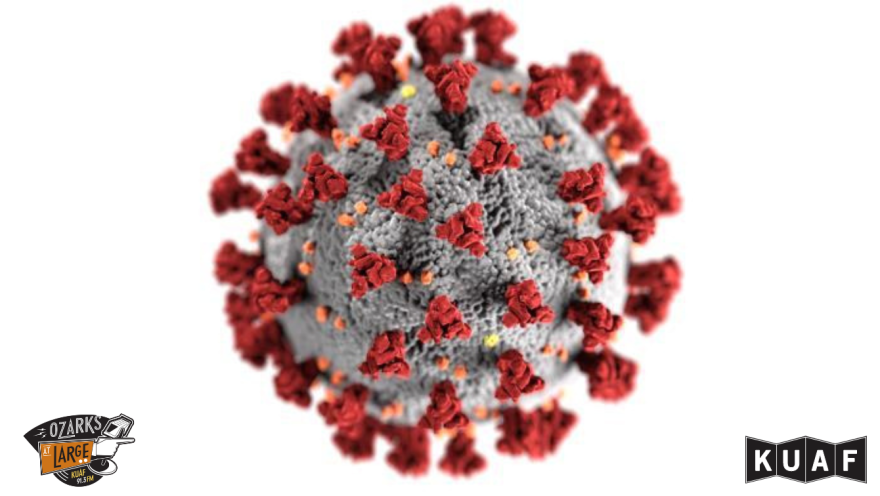COVID-19 is not taking a holiday this season. U.S. Centers for Disease Control and Prevention data trackers show a rise in test positivity, emergency room visits, hospitalizations and death. But the good news is the SARS-CoV-2 pandemic, after more than three years in circulation, is quelling, evolving into an endemic similar to seasonal influenza and Respiratory Syncytial Virus.
COVID-19 infection symptoms are changing as well, according to Dr. Robert Hopkins. He’s a Professor of Internal Medicine and Pediatrics and Chief of the Division of Internal Medicine at UAMS in Little Rock. He also chairs the National Vaccine Advisory Committee and serves as Medical Director for the National Foundation for Infectious Disease.
“With the current strain, sore throat is a very common one," he said. "Loss of taste and smell, what we thought of earlier in the pandemic, is less common, but it still does happen. Cough, fever, runny nose, we can get some clues based on particular symptoms people have, but I think we are still in a situation where testing is really important.”

The federal government continues to provide free at-home rapid antigen COVID-19 test kits to all U.S. households, available online. Test kits can also be purchased at local pharmacies and retailers. But Hopkins advises that it's best to test only if you experiencing symptoms.
“If you do a rapid test and don't have symptoms, the tests are not quite as useful because they're not as as sensitive or specific," he said. "But if anyone with symptoms has a positive COVID test, I would recommend they do several things. First and foremost, think about what your illness is right now — are you keeping food and fluids down, are you controlling your fever, are you doing other things to control your symptoms or do you need help with that? Second is, have you been vaccinated before and what’s your health status. If you have previously received a COVID vaccine even going back to our the early part of our vaccination program three years ago, that does reduce your risk of severe disease. Now, if you've been vaccinated recently that's even better, especially for people who have chronic health conditions who are at higher risk. The third piece is isolate. You need to stay away from other people if you don't want to take a chance on spreading that virus."

If unable to isolate, infected people should wear face coverings in public, Hopkins said, preferably using N-95 masks, which effectively prevent the spread of airborne respiratory virus particles. Elders and those with health issues should continue to mask in public to prevent catching the virus.
The Arkansas Department of Health reported the first case of COVID-19 in Arkansas on March 11, 2020. Since then, more than a million Arkansans have tested positive for the virus. This year, nearly 66,879 positive clinical cases have been reported, with 522 Arkansans dying from complications due to COVID-19. By comparison, five influenza-related deaths have occurred so far this season.
“COVID continues to circulate for a number of reasons," Hopkins said. "Part of it is that we've got a relatively unvaccinated population, compared to many other areas in the U.S. Part of it is that we have a number of behaviors that are being demonstrated in our communities that are not necessarily conducive to staying well and not passing viruses. And third, with the virus continuing to circulate and mutate, people are not necessarily going to be well protected. And so COVID is continuing to cause illness and deaths in our population, not just in elders although that's the majority, but many don't seem to recognize the fact that COVID can cause severe illness and death in people that are otherwise healthy -- young, middle-aged, children, infants, older adults.”
Hopkins advises holiday travelers taking public transit should wear masks, engage in frequent hand washing, and get the bivalent COVID-19 booster shot prior to departure. Free government-subsidized vaccines are no longer offered, except to low-income Arkansans, available at county public health units. Private insurance covers clinical COVID-19 vaccinations as well as shots obtained at retail clinics and pharmacies.
Medical Arts Pharmacy, with locations in south Fayetteville and Elkins, offers COVID-19 Pfizer-BioNtech and Moderna mRNA vaccines. Clinical Pharmacy Specialist Julie Stewart says because federally subsidized vaccines are no longer free, vaccine supplies are limited.

“We're able to get it," Stewart said, "but only in small amounts. And part of that is, as you were saying, the Department of Health and the federal government provided it at no charge, so we could order large quantities of vaccine, you know hundreds and hundreds of doses at time. We have an ultra-cold freezer for the Pfizer vaccine, so we can prolong its shelf life. We were even provided supplies to administer the vaccine. But now the vaccine costs over $100 per dose, the cost to the pharmacy, so we can't afford to buy 500 doses at a time, it's just not feasible to do that. So we are getting supplies week by week.”
Stewart suggests patrons call the pharmacy to check. The pharmacy also sells test kits and dispenses Paxlovid, a COVID-19 treatment, at no charge. But supplies of the federally subsidized medication are scheduled to run out this year, requiring consumers to pay for the drug with insurance or out of pocket.
Stewart warns anyone who feels sick should avoid gathering for the holiday to protect family and friends.
“It’s not fun to miss a holiday, but sometimes you just have to stay home,” she said.
SARS-CoV-2 continues to mutate in order to replicate and spread. Currently, the Omicron XBB.1.5 strain is most prevalent and controlled with the latest bivalent booster shots. National vaccine data show, however, that only around 15 percent of adults are getting boosters. Experts blame vaccine fatigue.
“The vaccines that we have for COVID-19 reduce the risk for infection for only short periods of time," Dr. Robert Hopkins said, which is why booster shots are important. "But vaccines reduce the risk for severe illness, so in most people there is real value in getting vaccinated. And there are not common or major side effects for most people, from the COVID-19 vaccine, which is really very safe.”
But Hopkins warns repeated COVID-19 infections can result in what’s referred to as Long COVID.
"Long COVID is a new phenomena with some people having neurologic symptoms," he said, "and some people having chronic lung conditions. We also know that people that have had COVID infection are at increased risk for heart attacks and strokes and increased risk for development of diabetes. There are many complications that can develop with COVID-19 infections, but data shows that COVID-19 vaccines reduce that risk for developing long COVID.”
Catching COVID-19 offers some natural immunity from reinfection by similar variants for at least six months, experts say. But herd immunity, which develops in large populations against diseases including smallpox, polio, and diphtheria — achieved through mass vaccination — is unlikely for COVID-19 due to widespread vaccine resistance, according to National Institutes of Health research. The major reasons are disbelief, misinformation and conspiracy theories generated by COVID deniers.








